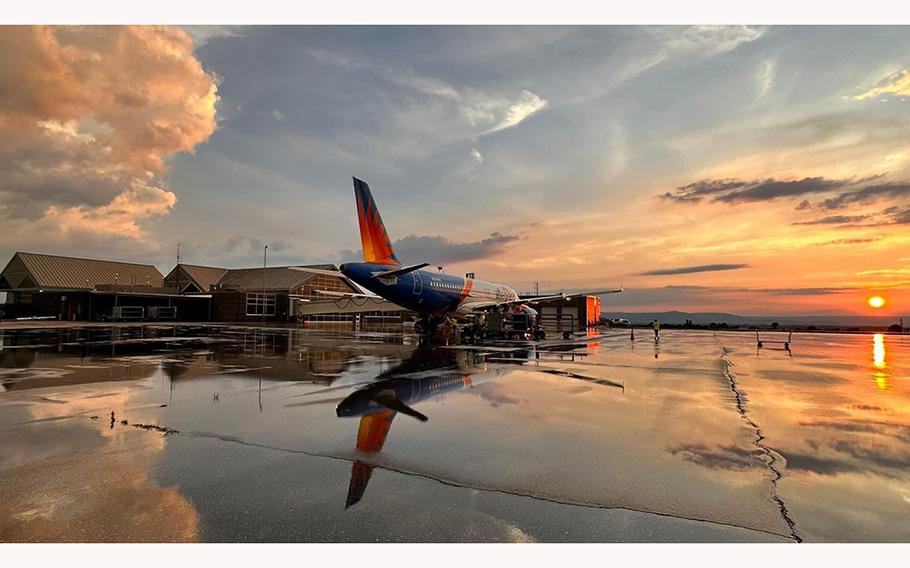
An aircraft is parked on a wet tarmac at Hagerstown Regional Airport in Maryland. Allegiant Air says the nation’s aviation industry is short about 17,000 pilots in 2023 and that number could double by 2032. (Facebook)
(Tribune News Service) — Allegiant Air is trying to address a nationwide pilot shortage by initiating three programs to train, recruit and hire aviators to fly its planes.
As travel demand has hit historically high levels in the past year, the nation’s aviation industry is short about 17,000 pilots in 2023, and that number could double by 2032, Allegiant officials said.
The shortage is years in the making and began when thousands of pilots hit their Federal Aviation Administration-mandated retirement age of 65. The shortage was exacerbated by early departures of pilots from their companies during the COVID-19 pandemic.
“The average age of pilots is typically 50-plus, and mandatory retirement is 65 years old, and then the pipeline or supply has been lacking for many years,” said Tyler Hollingsworth, Allegiant’s vice president of flight crew operations.
Allegiant is attempting to replenish that pipeline with three pathway programs — Accelerate, Altitude and Military Pilot Pathways — designed to help students and veterans overcome barriers that may exist when training to become a pilot.
Allegiant announced Monday that it is accepting applications for the three programs.
Mike Boyd, president and CEO of Boyd Group International, an Evergreen, Colorado, aviation consultant, said while it’s important for airlines to plan for personnel, the airline pilot shortage is “definitely blown out of proportion in some aspects.
“Airlines will adjust to the pilots that are available and the air transportation system will too,” he said. “You want to line up all the expertise you need: pilots, mechanics, technicians. They need to continue to do that.”
Students who attend aviation programs at partner universities including Purdue, Kent State and Western Michigan can enroll in the Accelerate Pilot Pathway and receive mentorship, help with regulatory credentials and conditional employment as an Allegiant first officer.
“With the Accelerate program, it offers the ability to be assigned a mentor and guided through this whole process as you go through your certificates and training to better ease that transition from the training world to the 141 world,” Hollingsworth said.
Part 141 pilot training is part of the FAA’s commercial airline pilot certification program.
Beginning pilots who are enrolled at Spartan Education Group’s Broomfield, Colorado, campus have the opportunity to apply for the Altitude Pilot Pathway at Allegiant, a training program that relieves up to $50,000 of student pilot training debt after three years of flying for Allegiant.
Allegiant also will help qualified transitioning military pilots obtain their necessary certification to become an Allegiant first officer.
Candidates on their way to becoming an Allegiant first officer via the pilot pathway programs train at Allegiant’s state-of-the-art training facility in Las Vegas, which houses three FAA Level D Airbus A320 flight simulators to gain cockpit experience.
Allegiant believes it has an edge in hiring pilots because of the way its operations work. Pilots generally work out-and-back schedules minimizing the amount of time they spend away from their families.
“A long time ago, I was told I had to make a choice. I could make a choice between family or being a pilot — but Allegiant has that innate ability to bring both together,” Hollingsworth said.
©2023 Las Vegas Review-Journal.
Visit reviewjournal.com
Distributed by Tribune Content Agency, LLC.